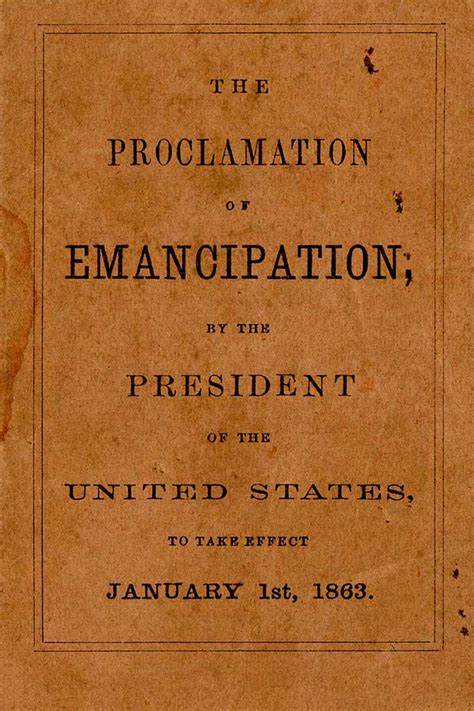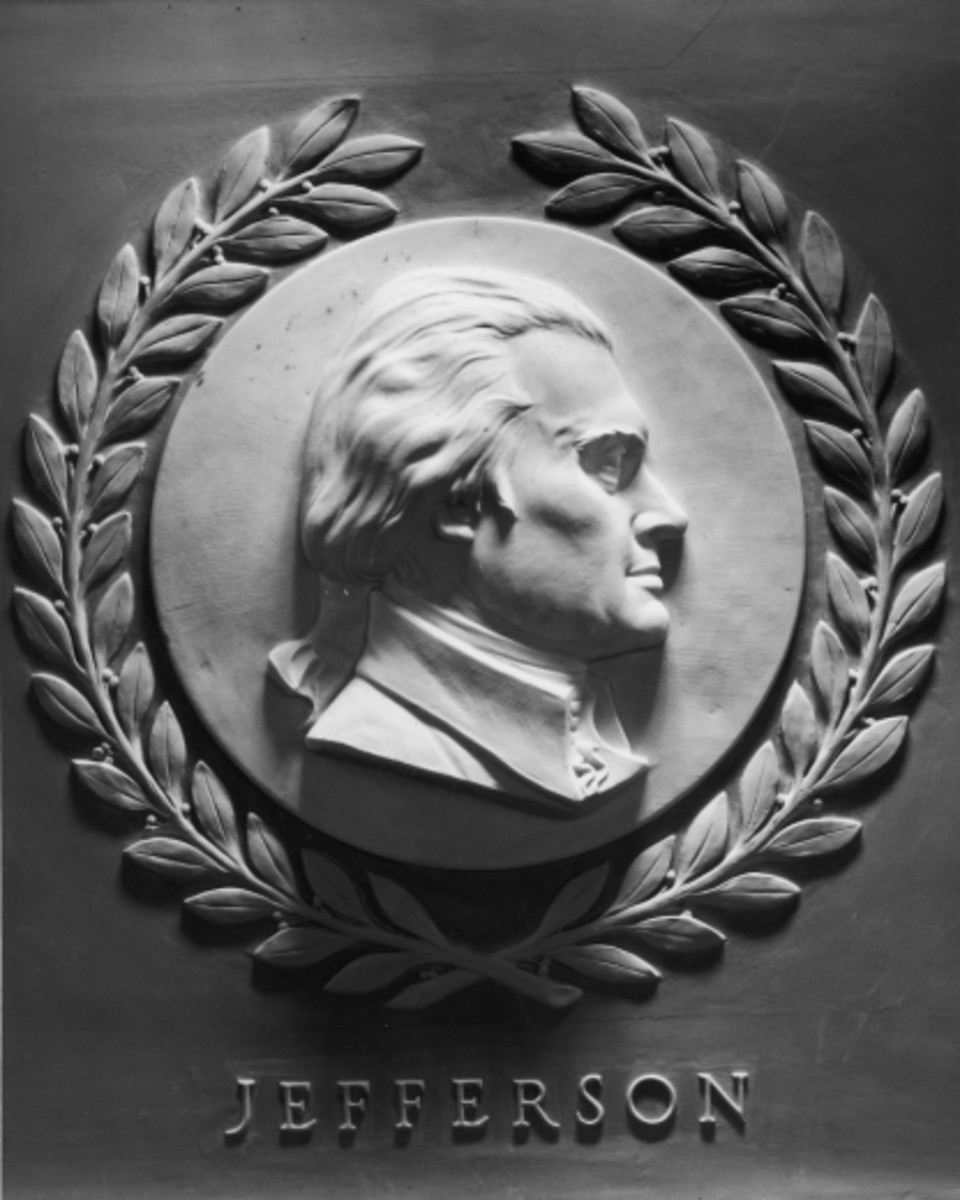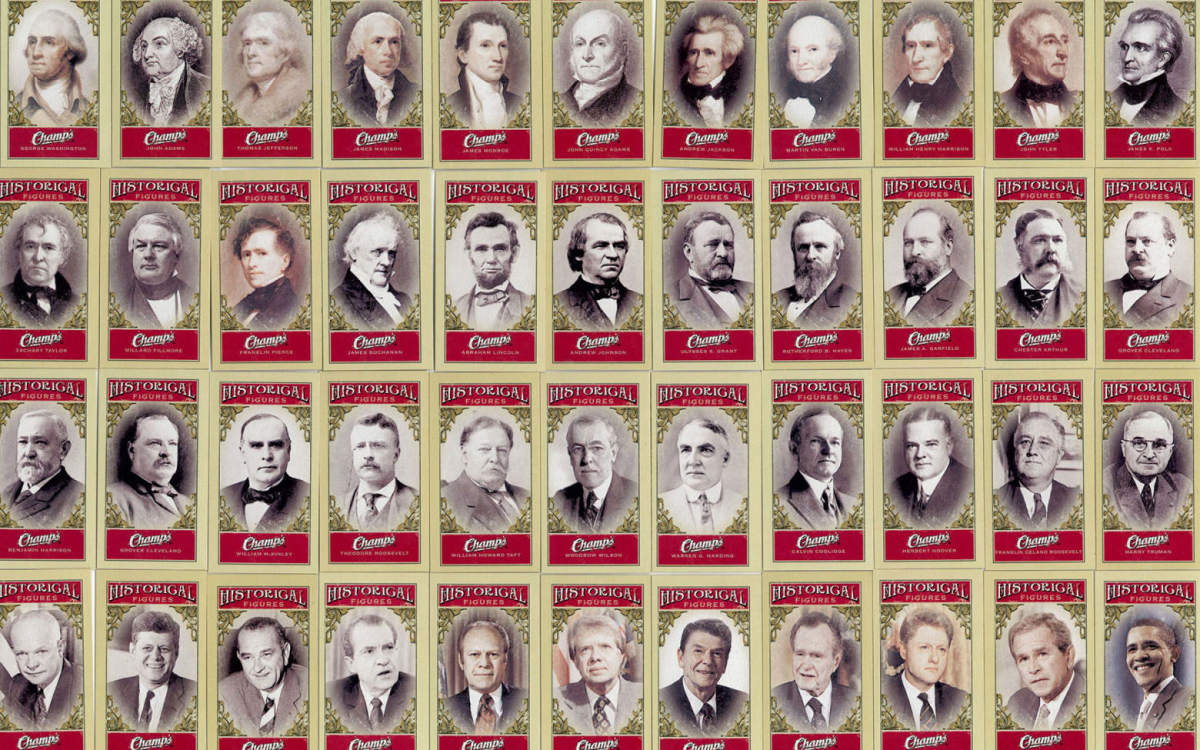Part 3 on The Amendments of the U.S. Constitution
The Emancipation Proclamation by President Lincoln

Amendments 9-13 of the U.S. Constitution
In Part 3 on the Amendments of the Constitution we are going to cover Amendments 9 to 13.
To start with let's take a look at Amendment IX of the U.S. Constitution. What do you think the 9th Amendment says?
Is it ...
a. Certain rights maybe restrained or denied in times of national emergency such as in a time of war. Sorry, wrong answer! Alright how about...
b. The Constitution may be enumeration in a way that certain rights may be denied such as in a natural disaster that effects the country such as a pandemic, etc. Nope, wrong again! How about...
c. The enumeration in the Constitution, of certain rights, shall not be construed to deny or disparage others retained by the people. Yes, finally this is the correct answer!
Now that we have the correct answer, let's take a look to see what the framers of the 9th Amendment had in mind when they wrote and passed this amendment.
From Document 5
"John DeWitt," NO. 2
Oct. 1787 Storing 4.3.8
The Compact itself is a recital upon paper of that proportion of the subject's natural rights, intended to be parted with, for the benefit of adverting to it in case of dispute. Miserable indeed would be the situation of those individual States who have not prefixed to their Constitutions a Bill of Rights, if, as a very respectable, learned Gentleman at the Southward observes, "the People, when they established the powers of legislation under their separate Governments, invested their Representatives with every right and authority which they did not, in explicit terms, reserve; and therefore, upon every question, respecting the jurisdiction of the House of Assembly, if the Frame of Government is silent, the jurisdiction is efficient and complete." In other words, those powers which the people by their Constitutions expressly give them, they enjoy by positive grant, and those remaining ones, which they never meant to give them, and which the Constitutions say nothing about, they enjoy by tacit implication, so that by one means and by the other, they became possessed of the whole.--This doctrine is but poorly calculated for the meridian of America, where the nature of compact, the mode of construing them, and the principles upon which society is founded, are so accurately known and universally diffused. That insatiable thirst for unconditional control over our fellow-creatures, and the facility of sounds to convey essentially different ideas, produced the first Bill of Rights ever prefixed to a Frame of Government. The people, although' fully sensible that they reserved every tittle of power they did not expressly grant away, yet afraid that the words made use of, to express those rights so granted might convey more than they originally intended, they chose at the same moment to express in different language those rights which the agreement did not include, and which they never designed to part with, endeavoring thereby to prevent any cause for future altercation and the intrusion into society of that doctrine of tacit implication which has been the favorite theme of every tyrant from the origin of all governments to the present day. (1)
From Document 7
James Madison, House of Representatives
8 June 1789 Annals 1:439
It has been objected also against a bill of rights, that, by enumerating particular exceptions to the grant of power, it would disparage those rights which were not placed in that enumeration; and it might follow by implication, that those rights which were not singled out, were intended to be assigned into the hands of the General Government and were consequently insecure. This is one of the most plausible arguments I have ever heard urged against the admission of a bill of rights into this system. but, I conceive, that it may be guarded against. I have attempted it, as gentlemen may see by turning to the last clause of the fourth resolution [the Ninth Amendment]. (2)
What they had in mind was that since it would be impossible to think of all the reasonable natural rights a person has for them to be stated in the Constitution it was necessary to infer by this amendment that those rights will not be infringed or denied.
Now that you have had a chance to review these writings is there mention of the right of privacy that supersedes the right to life? Obviously not! What they had in mind was that since it would be impossible to think of all the reasonable natural rights a person has for them to be stated in the Constitution it was necessary to infer by this amendment that those rights will not be infringed or denied. Does this mean that certain "Politically Correct" rights can and should trump over other rights such as, for example, the part of the 1st Amendment that says in regard to Freedom of Religion, when it says" nor prohibit the free exercise thereof"? Absolutely not! As I wrote in part 1 of this series, if a Minister, Priest, Rabbi or Iman, etc. refuses to facilitate in a marriage ceremony for a same sex couple the right of that couple to get married has not been violated because there are plenty of others who would be willing to do the marriage ceremony for them. Furthermore, I doubt that the Founders would have been in favor of an Amendment that would deny the right that is granted by another such as in the 1st Amendment.
Now that we have examined the 9th Amendment thoroughly let's go on to the 10th Amendment. What does it say?
Does it say---
a. Even though an Amendment in a States Constitution is not mentioned in the U.S. Constitution that State Legislature most receive the approval of the Federal Legislation before that States Amendment to its Constitution can be ratified. Sorry, that is not the correct answer. How about ...
b. The powers not delegated to the United States by the Constitution, nor prohibited by it to the States, are reserved for the States that have a population of at least 1 million people. Nope, wrong again! How about.....
c. The powers not delegated to the United States by the Constitution, nor prohibited by it to the States, are reserved to the States respectively, or to the people. Yes! Finally, this is the correct answer.
Now that we know what the 10th Amendment actually says, let's examine some of the writings of the Founders to see what they had in mind when they wrote and passed the 10th Amendment.
Document 2
James Wilson, Pennsylvania Ratifying Convention
4 Dec. 1787 Elliot 2:418—82
Sir, I think there is another subject with regard to which this Constitution deserves approbation. I mean the accuracy with which the line is drawn between the powers of the general government and those of the particular state governments. We have heard some general observations, on this subject, from the gentlemen who conduct the opposition. They have asserted that these powers are unlimited and undefined. These words are as easily pronounced as limited and defined. They have already been answered by my honorable colleague, (Mr. McKean;) therefore I shall not enter into an explanation. But it is not pretended that the line is drawn with mathematical precision, the inaccuracy of language must, to a certain degree, prevent the accomplishment of such a desire. Whoever views the matter in a true light, will see that the powers are as minutely enumerated and defined as was possible, and will also discover that the general clause, against which so much exception is taken, is nothing more than what was necessary to render effectual the particular powers that are granted. But let us suppose--and the supposition is very easy in the minds of the gentlemen on the other side-- that there is some difficulty in ascertaining where the true line lies. Are we therefore thrown into despair? Are disputes between the general government and the state governments to be necessarily the consequence of inaccuracy? I hope, sir, they will not be the enemies of each other, or resemble comets in conflicting orbits, mutually operating destruction; but that their motion will be better represented by that of the planetary system, where each part moves harmoniously within its proper sphere, and no injury arises by interference or opposition. Every part, I trust, will be considered as a part of the United States. Can any cause of distrust arise here? Is there any increase of risk? Or, rather, are not the enumerated powers as well defined here, as in the present Articles of Confederation? (3)
Document 5
James Iredell, Proposed Amendment, North Carolina Ratifying
Convention
1 Aug. 1788 Elliot 4:249
Each state in the Union shall respectively retain every power, jurisdiction, and right, which is not
by this Constitution delegated to the Congress of the United States, or to the departments of the general government; nor shall the said Congress, nor any department of the said government, exercise any act of authority over any individual in any of the said states, but such as can be justified under some power particularly given in this Constitution; but the said Constitution shall be considered at all times a solemn instrument, defining the extent of their authority, and the limits of which they cannot rightfully in any instance exceed. (4)
Tragically this Amendment has been willfully misinterpreted as States Rights meaning that States have the right to deny other members of their States certain human rights like, for example, the right not to be enslaved or lynched because of their race, etc.
Now that you have had a chance to review these writings it should be clear that what the Founders had in mind by this amendment is that whatever is NOT in the U.S. Constitution should be up to each individual States to regulate as they see fit. For example, it should be up to the States to regulate their own Commerce not the Federal Government. Tragically this Amendment has been willfully misinterpreted as States Rights meaning that States have the right to deny other members of their States certain human rights like, for example, the right not to be enslaved or lynched because of their race, etc. These "right" are not mentioned neither are they hinted at in the Founding Documents of our nation or in any writings of the Founding Fathers. More on this at a later time.
Now that we are finished examining the 10th Amendment, let's go on to the 11th. What do you think it says?
Does it say....
a. The Judicial power of the United States may be construed to extend to any suit in law or equity, commenced or prosecuted against one of the United States by Citizens of another State, but not by Citizens or Subjects of any Foreign State. Sorry, that is not the correct answer. How about...
b. The Judicial power of the United States in regard to any suit in law or equity shall be beholden to all U.N. mandates. Wrong! That is not the correct answer. How about...
c. The Judicial power of the United States shall not be construed to extend to any suit in law or equity, commenced or prosecuted against one of the United States by Citizens of another State, or by Citizens or Subjects of any Foreign State. Yes! Finally, that is the correct answer.
Now that we have discovered the correct answer, let's look again at the writings of the Founders to discover what was their thinking when they wrote and passed the 11th Amendment.
Document 2
Hollingsworth v. Virginia
3 Dall. 378 1798
The Court, on the day succeeding the argument, delivered a unanimous opinion, that the [11th] amendment being constitutionally adopted, there could not be exercised any jurisdiction, in any case, past or future, in which a state was sued by the citizens of another state, or by citizens or subjects of any foreign state. (5)
From Chisholm v. Georgia, 2 U.S. 419
Supreme Court of the United States
Filed: February 19th, 1793
Precedential Status: Precedential
Citations: 2 U.S. 419, 1 L. Ed. 440, 2 Dall. 419, 1793 U.S. LEXIS 249
Docket Number: Unknown
Supreme Court Database ID: 1793-001 (http://scdb.wustl.edu/analysisCaseDetail.php?cid=1793-001-01)
Author: James Iredell (/person/1594/james-iredell/)
Upon which Mr. Randolph, the Attorney General of the United States, as counsel for the plaintiff.
*429 IREDELL, Justice.
This great cause comes before the Court, on a motion made by the Attorney-General, that an order be made by this Court to the following effect:
This content is accurate and true to the best of the author’s knowledge and is not meant to substitute for formal and individualized advice from a qualified professional.
© 2020 Rebecca Fahlin Freelance Copywriter








